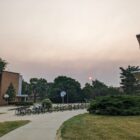News
Michigan residents weathered a summer of poor air quality
|
Nicoline BradfordHaze from the Canadian wildfires hung over Brody neighborhood at MSU in July, 2023. This summer Michigan residents saw the real consequences of climate change. In early June and throughout July, Michiganders woke up to hazy days and air quality warnings. Robert Wahl, an environmental epidemiologist at Michigan State University, said the levels of air pollutants this summer are very unusual for Michigan. The Air Quality Index, AQI, is used to measure levels of air pollutants on a scale of “good” to “hazardous.” While AQI measures multiple pollutants, the most concerning is particle pollution smaller than 10 micrometers.This is called fine particulate matter and is a direct result of the wildfires raging through Canada.

